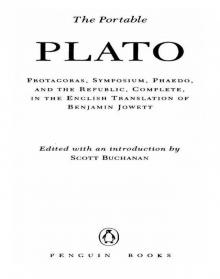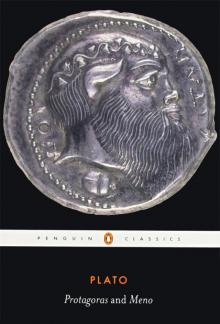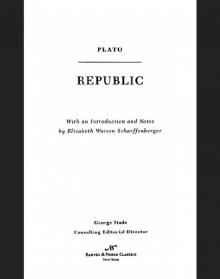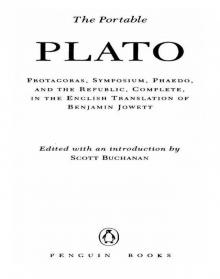Protagoras and Meno Read online
Page 2
The middle section of the dialogue is puzzling. Socrates raises an issue discussed in other dialogues: whether the different ways of being good – that is, the various ethical qualities, such as bravery and moderation – are all at bottom one and the same thing. This is the idea, also known as ‘the unity of the virtues’, that Aristotle ascribes, as the claim that all ethical qualities are ‘forms of knowledge’, to Socrates in his Nicomachean Ethics (6.13). Protagoras, again defending a common-sense view, maintains that the parts of being good are more like the parts of the face (all parts of one thing but unlike each other), and that people can have one – say, bravery – but lack another – say, a concern for what's right (329). Socrates defends the view that the parts of being good are one and the same by mounting three arguments before the interlude: that respect for what's right is the same as religiousness; that knowledge and good sense are the same (on the ground that each is the opposite of stupidity); and that respect for what's right can be equated with good sense, though their argument is left unfinished because Protagoras gets impatient and goes off on a tangent.
These arguments have evident flaws, some of which Protagoras is allowed to point out. It is not uncommon to find in Plato's works plainly weak arguments used in defence of claims which nonetheless seem to be intended to be considered as serious options – such as the claim that all the different parts of being good are really at bottom a matter of a certain kind of knowledge (a claim that is repeated in both the Laches and the Meno). Plato meant these writings to serve in part as an invitation to philosophy, one that forces us to think through and evaluate, for ourselves, the claims made and the arguments used in support of them.
Another half-comic, half-serious section allows Plato both to poke more fun at the assembled sophists – parodying the nit-picking of Prodicus' verbal distinctions and the jargon-laden pomposity of Hippias – and to make some serious points about how proper discussions should proceed. The assembled worthies eventually agree to Socrates' preference for question-and-answer over the professors' liking for grand speeches, but now it is Protagoras' turn to do the asking, and his chosen subject is the meaning of a song written by Simonides. More parody follows, this time by Socrates, of the sophistic style of literary criticism. He tells an absurd story about the Spartans being closet-philosophers and rounds off with the withering remark that bringing poets into a conversation is like hiring flute-girls – the lap-dancers of the day.
The last stretch of the dialogue sees Socrates trying to persuade Protagoras and the others that all the parts of being good, even bravery, are just a kind of knowledge. This upshot to their debate, as Socrates points out in the personified voice of their Ending, reverses their initial positions, because at the opening of the discussion it had been Socrates casting doubt on whether being good could be taught, and Protagoras insisting that it could. Now Socrates is the one who is committed to the view that people can be taught to be good, since every part of being good – even bravery – is a kind of knowledge, and he assumes, here as in the Meno, that all kinds of knowledge can be taught.
Two fundamental philosophical issues are introduced in the last stretch, ones that are still debated today. Socrates (apparently) begins to advocate a version of hedonism – the view that the only good thing in life is pleasure – and in the process denies that it is ever possible to do something you know is bad for you. That is, he denies there is such a thing as ‘lacking self-control’ (also known as akrasia, or ‘weakness of will’). What, he asks, is the relation of pleasure to the good, of something being pleasurable to its being a good thing? Are they the same? And is it possible for a person to know what's good but fail to do it, and choose something less good instead? In these discussions, we find Socrates and Protagoras united. They both hold, against the widespread view, that knowledge is all-powerful and cannot ever be defeated by contrary desires or emotions – by desire for pleasure, or by fear, or by anger. Socrates undertakes to disprove the popular view and tries to show that the common excuse – ‘I did something I knew was bad, because I couldn't resist the pleasure’ – involves an absurdity. He gets all parties to agree that what's pleasurable and what's good are one and the same, and likewise what's painful and what's bad. Then, by a clever substitution argument, the excuse becomes ‘I did something I knew was bad because I couldn't resist what's good,’ or, with the reverse substitution (replacing ‘bad’ by ‘painful’), ‘I did what I knew was painful, because I couldn't resist the pleasure.’ Each of these statements is meant to sound self-evidently absurd.
The common view, then, that we sometimes knowingly choose the worse option must be replaced by Socrates’ new diagnosis: what people call ‘doing what you know is bad because you can't resist the pleasure’ must in fact just be a matter of ignorance – i.e. of not really knowing that what you're doing is bad for you. Really – he insists – it's just a failure to measure correctly the pros and cons of alternative courses of action that accounts for such behaviour. This is the famous Socratic intellectualism. It assumes that a person's motivation must always reflect how they evaluate the alternatives and infers that a wrong choice must always flow from a wrong evaluation, never from succumbing to temptation in spite of knowing what is best (which most of us believe can happen pretty often). A closely related theme is presented much more briefly in the Meno at 77 – 8, where Socrates argues against Meno's idea that people can want something even though they know it is bad for them and harms them. If you agree with Meno, and with the ‘ordinary people’ who appear in the Protagoras, that such irrationality is possible, it is a challenge to see just where Socrates’ ingenious refutations can be faulted.
To find Socrates apparently endorsing the view (the one he initially attributes to ordinary people, and uses against them) that pleasure is the sole good is itself surprising. Likewise the claim that the salvation of our lives is a kind of measuring knowledge – the ability to measure pleasures and pains correctly, and not to be taken in by illusions based on some plea-sures being nearer than others. (Contrast Protagoras' more common-sense view, in his ‘Great Speech’, that the salvation of humankind lies in our sense of right and wrong.) Does Plato expect the reader to take seriously the idea that being good is just a matter of knowing what is and is not pleasurable? Critical opinion remains divided on the question of his (and Socrates) sincerity.
At all events, John Stuart Mill was right to see in this leading idea a precursor of his own views. In his Utilitarianism, he combines hedonism – the view that the only good is pleasure – with the claim that the right action is one which promotes the general happiness. Though this latter idea is not present in the Protagoras – which focuses on the agent's own pleasures, not on universal pleasure – Mill certainly found here the idea of a science of measuring and weighing up pleasures and pains. Hence his description (Utilitarianism (1861), chap. 1) of the Protagoras as presenting Socrates asserting ‘the theory of utilitarianism against the popular morality of the so-called sophist’.
The Meno
The Meno is often thought to mark a transitional point in Plato's writings. In part it resembles some earlier dialogues in which Socrates conducts an instructive but fruitless inquiry into some ethical concept, but it also introduces some themes which will be prominent in Plato's more mature philosophizing, such as the theory that learning is remembering, and the method of inquiring through a hypothesis. After an inconclusive and frustrating first third in which Socrates and Meno search for a definition of being good, new impetus to the inquiry is given with the startling suggestion that learning is really just remembering – the famous ‘theory of recollection’, which is thought to be Platonic, not Socratic, in origin, and which appears again in some later dialogues. The scene in which Socrates questions a slave on a geometrical problem is unforgettable, and raises – among other issues – the question of innate knowledge, something that has remained a hot topic of debate in all periods of philosophy. From that new impetus, the inquiry takes a more fruitful turn, th
ough the earlier conclusions about being good, which seemed to be safe (that it is a kind of knowledge and can be taught) are overturned in the closing pages. Or are they?
Like the Protagoras, the Meno deals with the question – here posed right at the start by a young nobleman from Thessaly, Meno – ‘How do people come to be good? By teaching, by their nature, or how exactly?’ Socrates insists on first investigating what being good is, because, until they know that, there's no hope of knowing whether it can be taught. As in the Protagoras, the contested nature of being good is soon evident. Meno first links it to a person's role in life: being good, for a man, is a matter of ruling the city well, and of helping friends and harming enemies; for a woman, it is running the household well. Like many from a privileged background, Meno is keen to believe that being rich and powerful is somehow linked with being a good man, but he also readily accepts Socrates’ prompts to focus on ethical qualities, such as respect for what's right and moderation (73a–b, 78d–e). The ultimately unsuccessful examination of Meno on the question of what being good is, which occupies the first third of the dialogue, has many features in common with other, early dialogues such as the Laches (what is bravery?) or the Charmides (what is moderation?). The pattern is this: Socrates – who always insists on his own ignorance – asks the question ‘What is such-and-such?’ The other parties give answers which he criticizes, typically because they list many instances of such-and-such and fail to give a single account; because they leave out something essential (see 73a–b); and generally because they don't capture the essence of such-and-such – what makes it what it is. After several failed attempts by Meno to say what being good is, Socrates offers sample definitions of shape and colour as a way of showing the kind of account of being good he is after. These are of interest in their own right, and the second definition of shape (as ‘the thing that borders a solid’ [76a]) shows the clear influence of the geometry that has come down to us under the name of the later mathematician Euclid.
The search for definitions that give a thing's essence is ascribed by Aristotle to the historical Socrates. It has remained a key element in abstract philosophizing ever since, though it has also come under fire, notably in the later philosophy of Wittgenstein, who argued that we can understand concepts perfectly well without a grasp of any single underlying essence – something he thought was not there to be found. The task of finding a single definition of being good – of being a good person – is especially problematic, because it is what we might call a ‘thin’ concept (that is, liable to being filled out in almost any number of different ways, a feature that Meno illustrates in his very first attempt to define it). Some recent moral philosophers have reversed Socrates' order of priority (see 79b–d) and suggested that a better approach to this kind of task is to explicate ‘thin’ ethical concepts, such as ‘being good’ or ‘a right action’, in terms of what they call ‘thick’ concepts – concepts with a fuller, more definite content – such as ‘bravery’, ‘honesty’, ‘generosity’ and so forth.
At any rate, in the Meno, all attempts to work out what being good is are found wanting, including perhaps the most promising one, offered by a poet (77b): ‘to rejoice in what's fair and fine, and be able’ – that is, to have honourable desires and goals in life, and to be able to achieve them.
Two of the ideas for which Plato is best known are the so-called ‘theory of forms' and the notion that learning is really remembering – i.e. remebering things the soul knew before its incarnation in human form. These ideas are found together in his Phaedo, a work that refers back to the Meno and so must follow it. Our dialogue does not feature the ‘theory of forms’ – the thesis that true reality, and the objects of genuine knowledge, are things such as beauty itself and the good itself, which cannot be reached by the senses or by experience, but which must be discerned by purely intellectual means. Nonetheless, a focus on what has come to be called a priori knowledge (knowledge which does not depend on experience) is found in the most famous episode of the Meno, where Socrates questions one of Meno's slaves on a problem in geometry.
The episode is prompted by a puzzle known as Meno's paradox. Exasperated at their lack of progress, Meno raises difficulties for Socrates, who claims to know nothing at all about being good, yet still tries to find out what it is.
But how can you try to find out about something, Socrates, if you ‘haven't got the faintest idea’ what it is? I mean, how can you put before your mind a thing that you have no knowledge of, in order to try to find out about it? And even supposing you did come across it, how would you know that that was it, if you didn't know what it was to begin with? (80e)
These are serious questions, and Meno scores a fair point against Socrates' constant affirmations of total ignorance. If Socrates really knows nothing at all about being good, how is it he even manages to discuss it, and to correct Meno every time he makes a suggestion about it? But Socrates treats Meno's question as if it were equivalent to a different, and much stronger, claim, that it is impossible for us to try to find out anything whatsoever (regardless of what we claim to know of it beforehand): we can't try to find out what we know (because obviously there's no point in finding out what we already know) or what we don't know (because then we don't know what we're trying to find out about). Socrates calls this a ‘quibbler's argument’, and indeed the second part is decidedly fishy.
But rather than dismiss this as a trick, Socrates uses the paradox about the impossibility of inquiry as a springboard from which to launch his theory of learning as remembering, at first via a myth, then through a bold demonstration. He tells Meno to choose a slave, to whom he sets the following rather difficult problem: How long is the side of a square that is double the area of a square whose sides are two feet long? The slave is shown why his first two answers (four feet long, three feet long) are wrong; Socrates finally helps him to the solution by drawing the diagonal (whose length is √8) of the original square and showing why that forms the side of a square double the area of the original one. On getting the slave's assent to this, he declares to Meno that these answers were in the slave all along; ‘I, Socrates, didn't teach him anything.’ And the reader is likely to protest: ‘None of this shows the slave remembering the answer – rather, Socrates simply hands it to him on a plate. Why on earth should we think the slave knew or had true opinions about the answers all along? There's nothing special here, just Socrates explaining some geometry.’
This response is partly right, partly wrong. We're probably right not to accept the description remembering, much less agree that this establishes the further diagnosis Socrates gives, that the slave's soul was in possession of these truths before birth and indeed is immortal, ever-living. But, for all that, the episode shows that Plato is on to something important, a special kind of knowledge-acquisition. Even if the correct answer is in a sense provided by Socrates, the slave can understand why his first answers were wrong, and why the solution in terms of the diagonal is correct. He needn't take anything on trust from Socrates. An uneducated but intelligent person could even work it out for himself, as Pascal is said to have worked out much of Euclidean geometry on his own in an attic when a small boy. What Plato is demonstrating though Socrates describes it differently are the human powers of reasoning, and the ability to extend one's knowledge from within oneself. Indeed, Plato himself inserts a very clear doubt about the more extravagant conclusions (86b), though in the later Phaedo the doctrine that the soul is ever-living is defended more fully with several arguments, together with a new version of the theory that learning is remembering.
The Meno's ‘demonstration’ of pre-natal knowledge was tremendously influential on later philosophers who espoused the theory of innate knowledge, notably Leibniz, who admired Plato's ‘beautiful experiment with the slave-boy’ and thought its conclusions essentially correct, provided they were ‘purged of the error of belief in the pre-existence of the soul’. Like Plato, Leibniz thought mathematical knowledge the best example of innate
knowledge. What readers of Plato marvel at is the Meno's assumption that truths about being good – what it is and how it is acquired – are also in some sense already in us when we are born, and as hard-and-fast as mathematical truths, and susceptible to the same kind of inquiry from ‘within oneself. Yet here too Plato may have an insight that is imaginative and in some ways correct, and one which modern thinking has taken up, but in rather different terms. Evolutionary psychologists hold that we are not ethical ‘blank slates’; rather, our complex ethical intuitions are grounded in our evolved human nature, not acquired purely from experience.
The last stretch of the Meno presents a particularly sharp challenge to interpreters of Plato, since within a few pages we get an argument ‘from a hypothesis’ that being good is a kind of knowledge, and teachable, followed swiftly by a retraction, a new discussion and a new suggestion about being good. The ostensible conclusion of the work is that being good can't be taught since all the suggested candidates for its teachers – sophists, poets, decent people – turn out not to be successful teachers after all. Not being teachable, it can't be knowledge, so it must be more like correct opinion acquired by good fortune a sort of divine fluke. On one line of interpretation, influenced by Plato's later work the Republic, which recognizes a sort of citizen-goodness possessed by non-philosophers, Plato here makes Socrates seriously propose this new way of being good, such that being good is not a matter of having knowledge but a set of true opinions which needs no profound intellectual inquiry. This picture of being good may have its merits, but there are clear indications in the text that Socrates is being tongue-in-cheek in proposing it (see 99c, 99d). Note that just after making the suggestion, he strongly insists that right opinion, while it has its uses, is less long-lasting and less valuable than knowledge, which requires a working out of why the thing known is true (98a).

 The Portable Plato - Protagoras Symposium Phaedo The Republic
The Portable Plato - Protagoras Symposium Phaedo The Republic Protagoras and Meno
Protagoras and Meno Republic (Barnes & Noble Classics Series)
Republic (Barnes & Noble Classics Series) The Last Days of Socrates
The Last Days of Socrates The Portable Plato
The Portable Plato